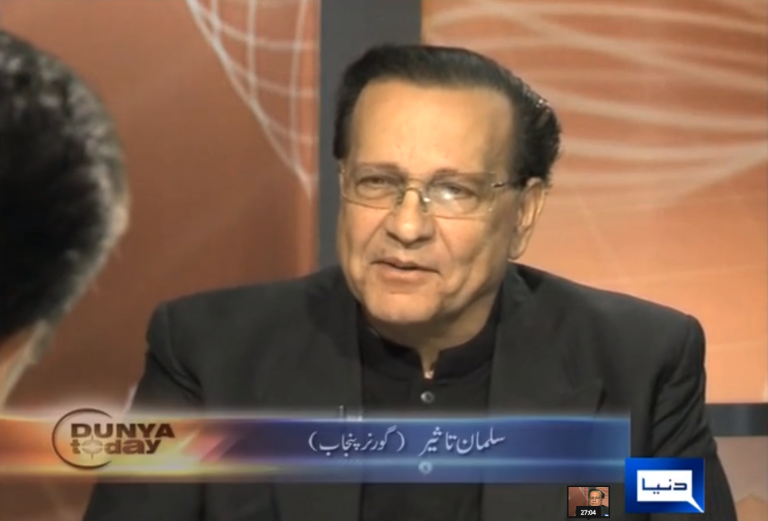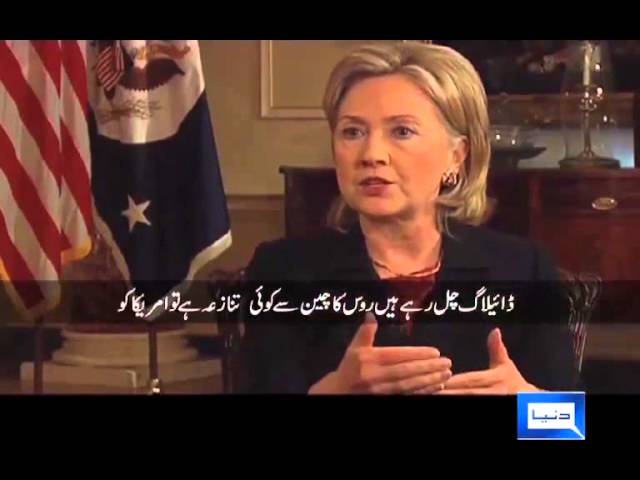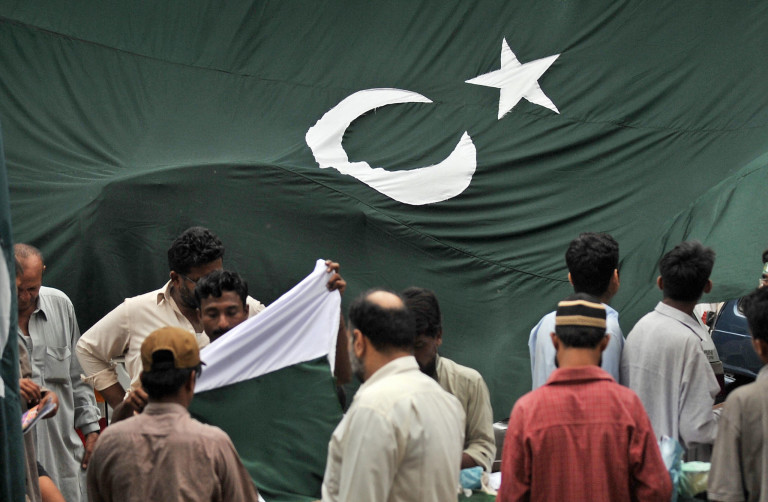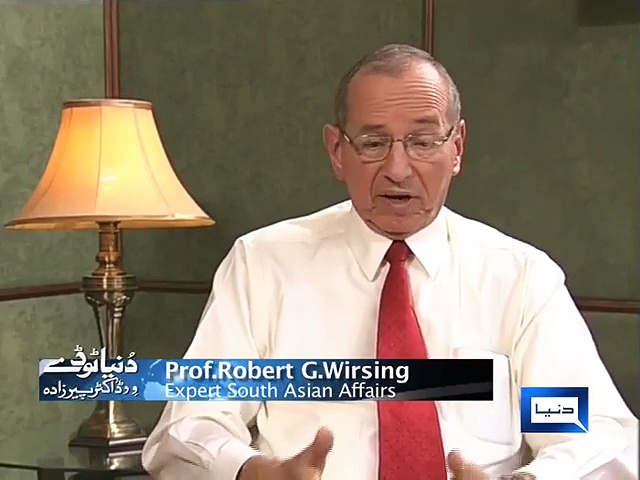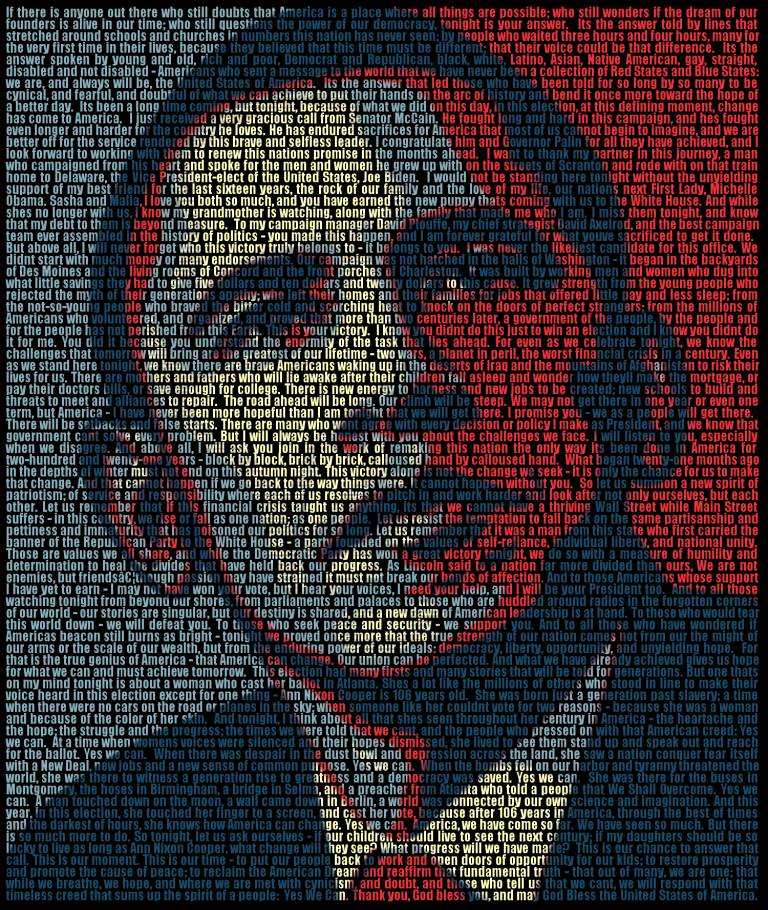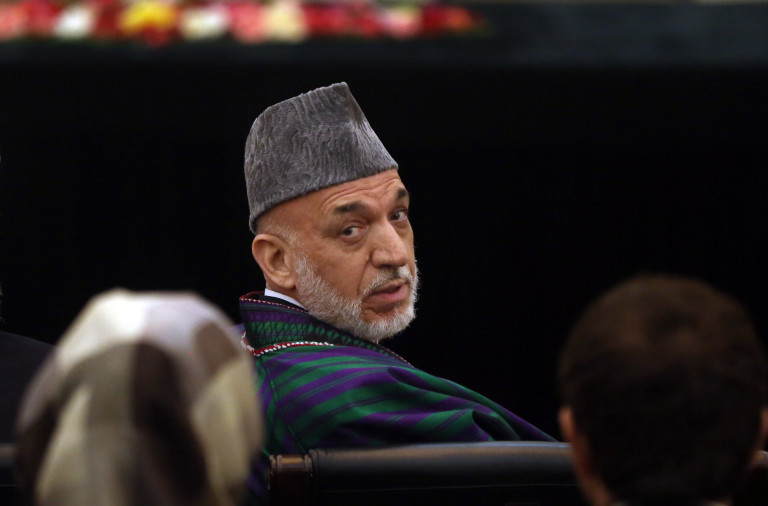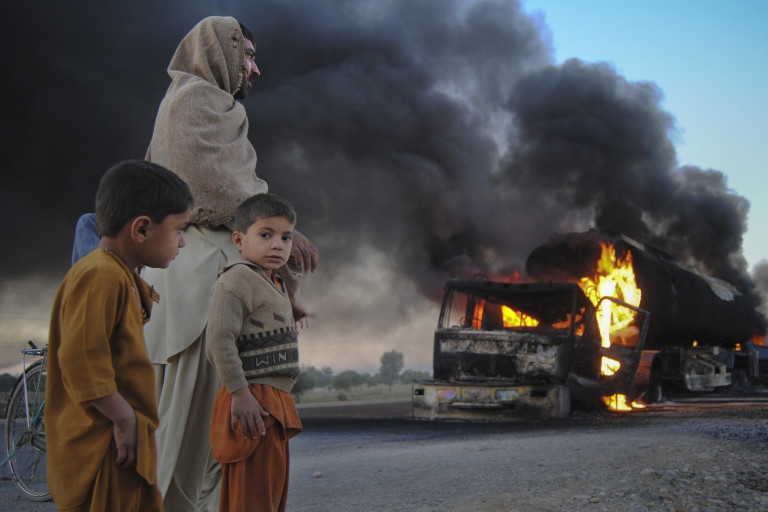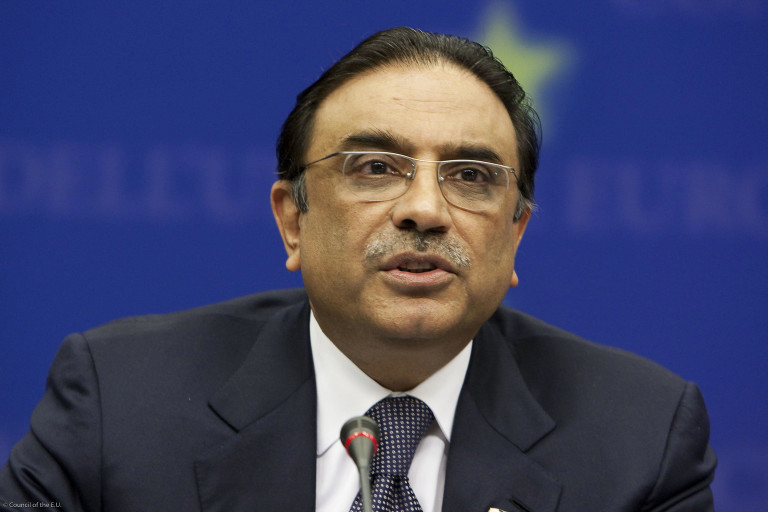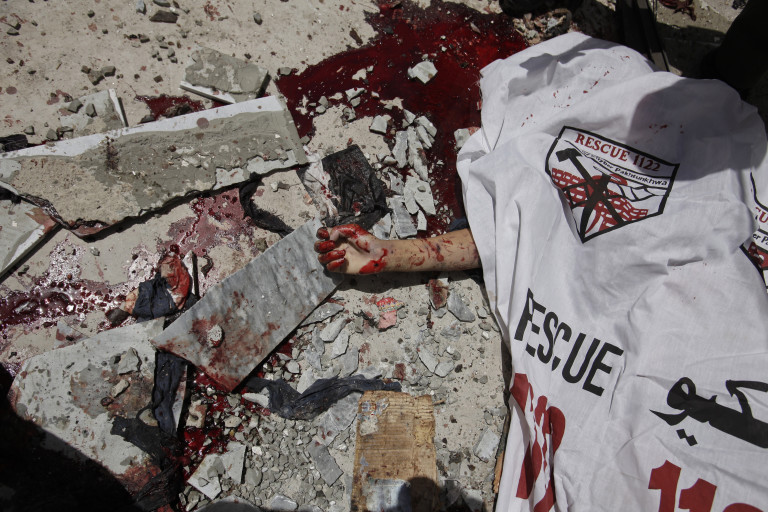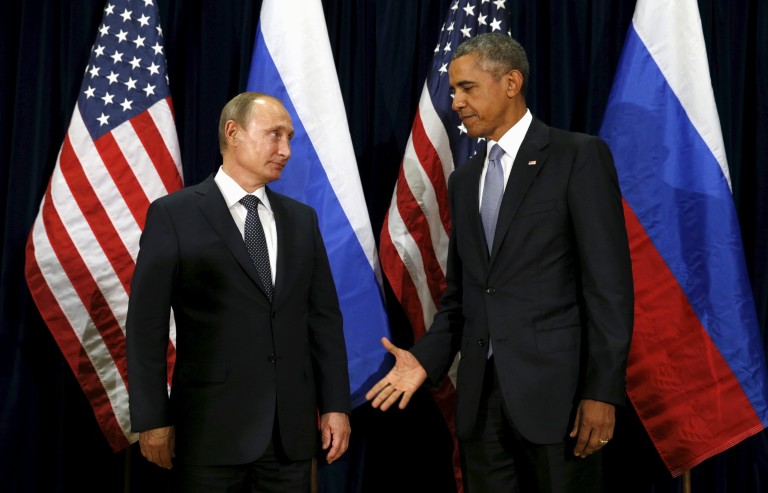Dr. Moeed Pirzada conducts exclusive interview with Amb Richard Holbrooke, United States Special Envoy for Afghanistan and Pakistan. Interview recorded with Amb Richard Holbrooke (Late) on 21st June, 2010 for Dunya News, Pakistan. Interview was conducted just two weeks after popular loya’s Jirga organized by Hamid Karzai in Afghanistan carried unconditional dialogues with the Taliban.
Discussion started from US Pakistan first ever strategic dialogues and eleven working groups like on energy defense, law enforcement, water, education and women empowerment etc. Some hardliner questions were asked like why promises made by Obama administration were not fulfilled and Pakistani products cannot have international market access. Richard Holbrook also shared interesting story of how US helped three Pakistani who were part of freedom flotilla headed towards Gaza blockade by Israel in 2010. Mr Holbrook said that Mr Barak Obama has co sponsored famous Kerry Lugar bill for Pakistan when he was senator and Bush administration was not interested. He also said that frequent visits of other US officials in Pakistan Afghanistan doesn’t mean that he was sidelined he said they all work as a team and everyone plays his own role.
Amb Richard Holbrooke in debate with Dr. Moeed Pirzada
Dunya Today: An Exclusive Interview with Salman Taseer Governor Punjab 27, May, 2010
An Exclusive Interview with Salman Taseer Governor Punjab 27, May, 2010. This interview with Salman Taseer, Governor Punjab, was recorded few days after our interview with CM Punjab, Shahbaz Sharif. This was a time when PPP’s Governor had a very tense relation with the PMLN Govt and CM Punjab. Interview captures that mood. Salman Taseer explained why he became intern setup minister during Musharf regime. He said it was temporary phase and he never gave statement against Benazir Bhutto. He said that he was made Punjab Governor on recommendation by Asif Ali Zardari to Gen Musharraf and all PPP leaders attended my swearing Inn ceremony in governor house but PMLN didn’t attend it. In his interview salman taseer said that he was against trial of Gen Musharraf. Salman taseer criticized PMLN that they have differences with every other political party. He criticized PMLN for holding all the powers in Punjab by Chief Minister shahbaz sharif. Constitutional role of Salman Taseer as governor was discussed in the interview.
Shahbaz Sharif in debate with Dr. Moeed Pirzada
An exclusive interview recorded with Shahbaz Sharif, Chief Minister Punjab on the overall performance of Punjab Government and PML’s future politics in Pakistan. Interview was recorded on 21st May, 2010.
Moeed Pirzada put forwards two important questions in front of Shahbaz Sharif. First, People from Karachi to Khyber are seeing a confrontation between Federal government and Supreme Court? What Shahbaz Sharif and Federal government has to say on “Independence of judiciary” and “Importance of 18th amendment” ?
Second questions was directly linked with governance in Punjab and Shahbaz Sharif’s own performance during these 2 years, which is being compared by the critics of Shahbaz Sharif’s by his past performance during 1990 era? Shahbaz Sharif explains his and overall performmance of PML-N government, while also criticizes Governor Punjab Salman Taseer statements.
Shahbaz Sharif in debate with Dr. Moeed Pirzada
An Exclusive Interview recorded with Shahbaz Sharif, Chief Minister Punjab on the overall performance of Punjab Government and PML’s future politics in Pakistan. Interview was recorded on 21st May, 2010.Moeed Pirzada put forwards two important questions in front of Shahbaz Sharif. First, People from Karachi to Khyber are seeing a confrontation between Federal government and Supreme Court? What Shahbaz Sharif and Federal government has to say on “Independence of judiciary” and “Importance of 18th amendment” ? Second questions was directly linked with governance in Punjab and Shahbaz Sharif’s own performance during these 2 years, which is being compared by the critics of Shahbaz Sharif’s by his past performance during 1990 era? Shahbaz Sharif explains his and overall performmance of PML-N government, while talking he also criticized Governor Punjab Salman Taseer for giving useless statements.
Hillary Clinton Exclusive Talk with Dr Moeed Pirzada
Dr. Moeed Pirzada recorded an exclusive interview with Hillary Clinton in Washington D.C, US Secretary of State on the sidelines of US-Pakistan Strategic Dialogue, July 2010. Dr Pirzada raised important questions on Strategic dialogues importance and concerns of Pakistani public as these dialogues are taking place in context of Afghanistan, however Pakistan, faces serious dilemmas regarding its partnership with the U.S. Though the U.S. and Pakistan share decades of friendship, the relationship has remained unstable. Number of issues like water, energy, economic cooperation, security, education, communication and diplomacy were identified on the agenda of this meeting but no signs of meaningful progress on the issue of Free trade agreement between US and Pakistan. So the question remains: How will this relationship sustain itself in the post-Afghanistan scenario? Dr. Pirzada also pointed out the issue of water and problems linked with this in the context of South Asia. Will the U.S play a role of a mediator between India and Pakistan on the issue of water, keeping in view the original essence of Indus Water Treaty? Dr. Pirzada asked US Secretary of State if any progress is expected on US-Pak Civilian Nuclear Cooperation and U.S concerns related to Pakistan’s Nuclear Arsenal during these strategic dialogues?
Hillary Clinton; Famous Interview with Dr. Moeed Pirzada & Media Persons
Hillary Clinton, Secretary of State’s first media appearance in Pakistan after taking the charge of US State Department. The famous discussion was conducted by Dr. Moeed Pirzada in year 2009 wherein all important Media professionals also participated on behalf of their channels and this program simultaneously aired on all important news networks of Pakistan.
It was the time when Obama administration announced new strategic partnership for Pakistan and US including focus on people to people contact. Interview was done at her fifth visit to Pakistan. Representatives/anchors from all major media groups also participated and Dr Moeed Pirzada was mediator between the dialogues with Hillary Clinton.
Dr Pirzada asked her about the terms included in Obama administration new strategy for Pakistan and long and short term goals of Obama administration for Afghanistan.
Hilliary Clinton in the interview emphasized on the long term and doable partnership with Pakistan on all different issues. She also mentioned that on issue of militancy there should be deeper relationships between US and Pakistan. She appreciated the efforts of Pakistan military for their efforts in fighting against terrorism.
She said that we want to expand our relations to people to people contacts in civil society that will be start of a new chapter of relationship. She said that interests of Pakistan and US are common in the region as we are working to strengthen military and civilian relationship. Critical questions were asked from other anchor persons as well on which Ms Clinton replied with great patience.
Western Media’s War on Pakistan
Moeed Pirzada | Pakistan Herald |
While most Pakistanis complain of a media blitz against their country and society few have given serious thought to what this means in the longer term.It may be time to realize that in the evolving information and disinformation driven global order many small and developing states can virtually disappear if they fail to understand and control the way in which they are projected.Political science is not an exact science experts can always disagree and outcomes may vary.But it is important to develop an overall paradigm to understand what is happening.Theoretically speaking even if media targeted states manage to preserve their geographical forms they might still have to put up with so much external and internal pressure that their sovereignty is effectively eroded.
Iraq may not be a good example as it was physically attacked but at the same time it is important to remember that it was stripped of its legitimacy to “self rule” through a sustained media led disinformation campaign.Ironically the way in which events are unfolding Iraq might not be able to survive as one national unit for very long.Similarly the dehumanization of the Taliban had been going on for quite some time before the tragic events of 9/11.The terrorist attacks acted as an immediate catalyst but the Taliban who were out of sync with reality had forfeited their right to survival a long time ago.It may be relevant to raise the question If Pakistan is a “media targeted” state then what are the implications?
It should not be very difficult to appreciate why “media targeted states” might collapse or lose control of their destinies.Two things are important One in an increasingly integrated global village the concept of “national sovereignty” dating back to the Treaty of Westphalia has lost much of its relevance.What happens inside the jurisdiction of a so called sovereign state is of equal concern to many others outside its borders especially those with global interests.Second owing to the increasingly integrated and unipolar nature of the world the US led cross Atlantic states and their domestic institutions have assumed the role of “international regulators”.
This piece is not a debate on the morality of whether such “regulators” should exist.It is about the implications of this development.The power exercised by the media inside these societies is a direct outcome of this perceived need for “global regulation”.By providing platforms for various dominant stakeholders the media has assumed the role of custodian of collective interest.The destiny of small or developing states has thus become a question of how legitimate or useful they are in furthering or safeguarding the interests of key players inside these cross Atlantic societies.Small or weak states that fail to earn legitimacy within this functional model are up for “restructuring” which may take many forms.Creative destruction by war is only one of the options and is not applicable in Pakistan’s case.
In this “information disinformation” driven global order the strategic threat to small and developing states like Pakistan now lies in the build up of perceptions what reality may underlie the perceptions is of little consequence.Guns bombs bigger bombs and missiles can at best play a limited role in countering this strategic threat.Why? Because these tools provide a semblance of balance in regional situations and will be of little use when the legitimacy of a state its governing elite or key institutions is lost.If blue planet is an integral whole then “miscreants” with “genetic defects” need to be sorted out by the regulators of the planet.
The “miscreants” will not be identified and paraded by governments experts scholars and the academia but by the financial and managerial interests that control and influence major print and electronic media outlets.Individual writers columnists and correspondents however important they may appear on the face of it are of little consequence.Take a careful look at the stories related to Pakistan that appear on the pages and screens of major US publications and networks and you will be stunned by the level of contextual uniformity that characterize them.Individuality is either dead or has learnt to survive by making adjustments to the managerial vision that issues pay cheques flight and hotel bills and guarantees access influence and empowerment in the “marketplace” of ideas.
This pressure to maintain “contextual uniformity” vis a vis Pakistan also affects those academics and policy wonks in the West who may understand and see things differently but are unable to give expression to their understanding in a marketplace where all ideas have to fit in a skeletal arrangement.Most interesting however is the case of a few columnists politicos in exile and other public figures of Pakistani origin whose voices in print and the electronic media have increasingly become indistinguishable from those of Western media managers and political interests.I leave this question to the readers.It is the power of this “contextual stranglehold” that to literate and aware persons living anywhere in the western hemisphere and reading their morning paper and watching television has made Pakistan appear today as the epitome of global evil and chaos.
It is a place like Afghanistan Iraq or Haiti a country and society that threatens not only regional peace by causing waves of instability to reach India and Central Asia but the entire international order by brandishing nuclear weapons in the midst of a confused polity controlled by anti Western zealots.The government’s own admission in the recent nuclear proliferation controversy however wise under the circumstances has ironically confirmed those allegations that “rogue” elements may run amok in the system.Recently Pakistan’s former minister for information Mr Javed Jabbar contributed a piece to this newspaper titled “Facing a media world war”.
That analytical piece was within the limitations of a newspaper article a “tour de force” on the subject and is a must read for all those who profess a serious interest in media challenges faced by Pakistan.Mr Jabbar provides a brilliant and comprehensive summation of the causes origins and the strategic vulnerabilities and dilemmas the country now faces in this area.However owing to space limitations he has not been able to deal with the strategic responses the Pakistani state can offer.This is not going to be an easy task either.No one person or institution however much of a visionary can come up with a comprehensive response.This will need the meeting of select minds from various disciplines and fields that are able to understand this challenge from different perspectives.But the first and foremost thing will be to recognize the existence and nature of the threat.The strategic vulnerability Pakistan now faces in this media war is so serious that it should be without exaggeration compared to the threat to its survival that the country faced on the eve of India’s first nuclear test in 1974.
The single most important contribution at this stage would be to develop a blueprint for a “School of Modern Media Sciences” in other words an independent media university located preferably in Karachi.This entity of international standards should be planned in such a way that it can nurture a multidisciplinary multi lingual talent pool needed for Pakistan’s growing print and electronic media.This project may also help in establishing standards of education and training for the rest of the country.It is obvious that much thinking is needed in this direction and not necessarily in the form of newspaper articles.However it is high time that Pakistanis realized that they need to find ways and means to break the “contextual stranglehold” of “information disinformation” around Pakistan before it is too late.
Prof. Robert Wirsing in conversation with Dr. Moeed Pirzada on Water Issues of South Asia
Dr Wirsing said that over period of many years it seems Pakistan and India have gradually come to a tacit agreement for the settlement of ownership of territories and perhaps Line of Control can be a step to it so the dispute is no longer about changing the boundaries now. According to him military and civilian leadership of Pakistan understands that Pakistan no longer is in position to demand for any territory from India and thought of going for war on Kashmir is no longer is realistic prepositions. According to him water has become more central to Kashmir issue between Pakistan and India although initially it was only territorial issue. He said baghliar dam issue arose due to Pakistan objection of its construction by India over Chenab River.
Dunya Today: An Exclusive Interview with Anne W Patterson, US Ambassador for Islamabad, Pakistan…
This was Ambassador Anne Patterson’s first interview ever to Dunya News. Dunya was then a new channel launched in Dec 2008 from Lahore and was in the process of creating its mark on Pakistani media scene. This interview took place amidst widespread rumors that US mercenaries and assassins belonging to Black Waters were active all across Pakistan. Ambassador Patterson in this interview strongly denied that. However later on 27th Jan 2010, Raymond Davis, a CIA hired private assassin ended up shooting two persons in Lahore creating a series of tensions between the US and Pakistan which destroyed the career of Anne Patterson’s successor, Ambassador Cameron Munter.
Can Obama Come Up to the Expectations of the World?
Moeed Pirzada | Khaleej Times |
Bliss was it in that dawn to be alive” was how the young Wordsworth had eulogised the energy and feverishness of the French Revolution. Two hundred and nineteen years later another Bastille has fallen: America has elected its first black President. It is a defining moment. No doubt. Yet it is interesting to see how the reaction, the narrative, the nature of the comment, that continues, has assumed a life and meaning of its own.
Borrowing the expressions of film maker Michael Moore: “In a nation that was founded on genocide and then built on the back of the slaves, it was an unexpected moment…a good man, a black man, said he would bring change to Washington, and the majority of the country liked the idea.”
Notice the words: Change in Washington. But what could be the nature of that change in which people from New York to Karachi can simultaneously believe in? Is it even possible?
Few days before the elections, Noam Chomsky, had argued that an Obama victory will change little for America is governed by just one party and that is the business party; with Democrats and Republicans, entities with slight variations, taking turns to protect the interests of the big business. He then described the European reaction to Obama a European delusion.
Chomsky too was our hero. A hero of the times when our parents watched Dev Anand and Zeenat Amaan in the epic: “Hare Rama Hare Krishna”. Today whether Chomsky is a realist or a cynic: only history can judge. But two things are definite: One, in the age of Obama, he is out of sync and fashion; and second he should have used the term: “global delusion” for with the humiliation of neo-cons a world is falling over to make sense of what happened and above all to write, chat and celebrate.
Like the glittering prism of rain drops these comments reflect the relief not only of foreign policy wonks and realists in Washington and London, of new age philosophers from Ottawa to Istanbul; of democrats, civil right activists, feminists and Muslims everywhere but also of the stem cell researchers, environmentalists, film makers, doctors, teachers and school children dressed in all colours across the blue planet. And don’t forget the Taleban in the caves of Afghanistan. As we grapple with this immense and unbelievably diverse sense of human victory we are forced not only to fathom the persuasive power of Obama’s charisma and message but also the size of Bush’s ineptness and failure of the republican vision. In an age of globalisation and You Tube those idiots had offended the whole world.
And now this hitherto estranged world is jubilant as if somehow it has turned the tables on neo-cons. But the world didn’t vote on 4th November; Americans did. Yet it is behaving in a fashion as if Barack Obama was its candidate in the American elections as if through him it sees itself penetrating into the heart of the emporium: the White House. Just before the elections prominent columnist, Aijaz Zaka Syed, writing in Khaleej Times, passionately appealed to the Americans to reject the Republicans in the interest of the world. Could there be some explanation for all this?
And this comes from the most unlikely of places: Pakistan. Political economist, Mosharraf Zaidi, wonders at the global brand of Obama. Tracing the evolution of Obama’s consciousness he recounts: a Kenyan father, an Indonesian step-father, banker grandmother, a soldier grand father, a Jewish chief strategist, an Afro-American wife and two post-Ipod daughters. My friend Professor Adil Najam in Boston and many others in Pakistani media have discovered that Ann Dunham, Obama’s mother, had once lived and traveled on our dusty roads, as a UNDP consultant in Pakistan and even young Obama suffered the heat of Lahore and Karachi.
The bottom line of all this over active romanticism is that Obama with his cocktail of genetics and experiences will be representing the global consciousness, interests of the new age world, inside the heart of Michael Hardt and Antonio Negri’s empire and in simple terms will be able to end that mutually destructive relationship America and the world have been locked in since the Neo-con victory in Nov 2000.
But is a US president that powerful? Will Obama with his 52 per cent votes be able to do it? In the Pakistani morning of November 5th, as the results of Obama landslide started to roll in, I was watching the joint ABC/BBC broadcast and the anchor was trying to do the same poetry with Ted Koppel, that indomitable face of ABC for four generations. With his usual stony face, Koppel, the realist, the friend of Kissenger, blurted that he sees more of a positive thing outside and perhaps a reaction inside. A panicked ashen-faced anchor asked him to focus on the positive moment. Koppel agreed. But the unmistakable shadows of fear under his expressionless face stayed with me.
The global dimension of this election is undeniable. True! Obama benefited from demographic change, energised Afro-Americans and the economic crisis but an America increasingly isolated from its traditional allies dominated the minds of most liberal Christian and Jewish whites; from the beginning Obama and Axel Rod capitalised on this theme. And the results vindicate them.
Obama victory is in the final analysis a victory of the American system. Amidst new demographic and global challenges it has shown the ability to reinvent and redefine itself. Read the columnists world wide and you will feel that in a curious way America has also demonstrated that China can be the global production house, India can provide skilled labour and state of the art back operations; Middle East and Russia will supply energy and occasional mischief, Europe is good for history and welfare economics but when it comes to the synthesis of all this: the leadership of the new age lies squarely with an America where Christians & Jews, Hindus & Muslims, humanists and atheists of all colours can work together and self-actualise.
Where else will you look for global connect and leadership; if not in a society which represents microcosm of the globe itself? But this global dimension that provided the essential connect for Obama’s victory will now also define the challenge. As the newly-elected President, opposed by 48 per cent of the voters, takes on the complex challenges of Iraqi withdrawal, negotiations with Iran, a hopeless war in Afghanistan, a resurgent Russia and securing the support of Kaplan’s squabbling post-history Europeans he will find that Axel Rod’s “tightly wrapped campaign” has prepared him little for keeping both America and the world together on the same road. Honeymoon ends on January 21st, 2009. Good luck!
Time to Look Beyond Hamid Karzai
Moeed Pirzada | Khaleej Times |
Lies, denials and propaganda don’t change realities. Truth has a nasty habit of sneaking out. And sometimes it even bombards. In the last two weeks it blasted like a hailstorm on Bush administration’s Afghanistan policy.
First it was the Brigadier General Mark Carleton Smith, the outgoing top commander of the British forces in Afghanistan who admitted to Sunday Times in London that absolute military victory in Afghanistan is impossible. This bombshell from the good general soon lost its value with the news that Saudi King has arranged a meeting between the representatives of Hamid Karzai, the Afghan President, and those of Mullah Omar, elusive fugitive leader of the former Taleban regime and that the former Pakistani prime minister Nawaz Sharif, the most popular of the Pakistani politicians, is somehow part of these negotiations.
Whatever doubts could have been there were removed by Karzai himself who offered, in an interview on GEO Television, that he will personally guarantee the security of Mullah Omar if he decides to come to Afghanistan. This was certainly the biggest over-commitment of 21st century in the sense that Karzai cannot guarantee his own security outside Kabul’s green zone and that too with the help of US Special Forces. But let’s move forward as more interesting things followed.
French, jumped in with the leak of conversation between Sherard Cowper-Coles, the British envoy to Afghanistan and Francois Fitou, the French Deputy Ambassador to Kabul in which that top British diplomat predicted that Nato-lead military campaign against Taleban is destined to fail. But this was not all; the British Ambassador went on to argue that the foreign military presence is not part of the solution but that of the problem and that the best solution for Afghanistan would be installing an “acceptable dictator”
General David Petraeus, Bush Administration’s hero of Iraq, who is now taking over the US Central Command from end October, then joined with his own prescription. While speaking to a forum hosted by Heritage Foundation, he said that negotiations with some members of the Taleban could provide a way to reduce violence in parts of Afghanistan.
This was enough for any columnist to draw his or her own juicy conclusions about the shape of things to come but it looks like that the good Americans did not want to take any chances; lest there is any ambiguity. So we had another leak. New York Times disclosed that the draft National Intelligence Estimate (NIE), the first serious compilation of 16 Intelligence Agencies on the situation in Afghanistan, admitted that beyond the cross-border attacks the situation in Afghanistan is a mess created by the corrupt Karzai government that is not capable to stem the rise in Taleban’s influence.
I have always wondered: do leaks just happen or are done to send messages; to shape things along? The leak in Le Canard Enchaine, the Parisian paper, was certainly an expression of the French unwillingness to move along with a war that is increasingly not making any sense to European governments and the media — but then what is the significance of the leak of the National Intelligence Estimate?
I think we now have sufficient meat at the table to conclude a few things: One, US desperately needs a period of relative stability to declare victory in Afghanistan; Two, US and allies have concluded that such period of stability will not be possible without engaging at least some parts of Taleban resistance; Three; this marks the beginning of the end of the regime of President Hamid Karzai in Kabul.
At this point Hamid Karzai’s situation now resembles that of General Musharraf towards the end of 2007 when he was asked to take off his uniform and hold elections with promises of continuing support from White House. No one knows how quickly General Petraeus, Pentagon’s Houdini sets things into motion on this roadmap but the sooner he does the better it will be for everyone: for Afghanistan, for the US and its European allies, for Pakistan, Iran and even the Indians. And trust me this may be the best happy ending for Karzai too: safe with a lucrative future as lobbyist in Washington.
However, what frightens is that while the rational feedback and assessments flow from Pentagon and the Intelligence community there is no end to irresponsible political rhetoric in the US.
If I were George Bush or any of his intellectual cronies or even an ordinary American of any sort that supported all those gory actions since 9/11, and I now look around at: the mess in Iraq, failure in Afghanistan, suicide bombers popping up like Champagne bottles in nuclear Pakistan; or the melt down of the US economy with three of the five major investment banks disappearing and America the quintessential Mecca of capitalism embracing a half socialist economy after lecturing the whole world on the benefits of free markets, I am sure looking at all this I would either end up in a confession chamber in a church or worse: on a coach with a Freudian or Jungian analyst — preferably that looks like Sarah Palin – getting at least that part of my head examined that dealt with my foreign policy aspirations.
No! But this is not what we see inside the US. Instead we still see a public, a media and political elite that are so disconnected with ground realities, so obsessed with their own propaganda that the Presidential candidates try to outsmart each other in conceiving ever more aggressive military strategies for Afghanistan. Can you believe that they still think that the utter rot, the failure of the last seven years, can be managed by sending another three brigades to Afghanistan?
In reality whosoever wins the elections, America and the world needs a political leadership in Washington that can demonstrate wisdom and responsibility to fix up the economic mess, rejuvenate the markets and can take steps to restore America’s lost prestige. And preparing for a phased, ordered withdrawal from Afghanistan can be an important first step in that direction.
Many in this region will like the US to ultimately leave Afghanistan in haste and disgrace.
But this will further embolden the forces of medieval Islam and increase the regional chaos. America must be able to leave with a stable functioning system behind and if we reflect on all the disclosures, leaks and assessments of the past two weeks then the only way it will be possible is: by distinguishing between Taleban and Al Qaeda; by inviting Taleban to join a broad based government in Kabul and by working with both Iran and Pakistan to ensure the stability of a post-Karzai regime. May be David Petraeus understands that.
The War Needs to be Won, at Any Cost
Moeed Pirzada | Khaleej Times |
No single event in Pakistan’s recent history, despite all its scars, has inspired more comment, more heated discussion and more disagreement than the terrorist destruction of the Hotel Marriott in Islamabad last week. And yet it appears that despite the enormity of what happened, some of the key issues, even when raised, fail to get the attention they demand.
While the Marriott was still engulfed in flames — with the helpless trapped inside waving white shirts from their windows for help and rescue — the political pundits and spin doctors were on air on country’s more than two dozen news channels. And often ignoring the immediate needs of disaster management they were discussing political perspectives, conspiracy theories and bigger ideas. Since then in the last one week every brainwave, however weird it may sound in retrospect — has either been printed or has found expression in the electronic media.
Yet the key question: are we even competent to defend our cities from the terrorists has not been raised. No denying that the National Assembly has blasted the security apparatus for being negligent but that was a usual kind of mindless rhetoric because the question of negligence can only arise if the competence existed or was ever created in the first place.
I found it encouraging that academics like Prof Riffat Hussain of the Quaid-e-Azam University, Islamabad; analysts like General Talat Masood and editorial writers of Daily Times have at least pointed towards the issues of competence and the need for capacity building. Unfortunately, most in the politics and the media remained occupied by the larger questions of whether this is our war or not? Or how effective will be our strategies until the US and Nato keep the pot boiling in Afghanistan.
Unlike some ultra-liberals in Pakistani media and civil society, I don’t deny that these are fair and intelligent questions, and unless there is a broader political settlement of the conflict that rages from inside Afghanistan to our tribal areas there cannot be any chances of achieving peace.Nevertheless, an over emphasis on these arguments, excluding other issues at hand, diverts us away from the immediate nature of the challenge we are confronted with.
Our principal objective at this stage should be to deny the suicide bombers the impact of high profile successes inside our cities. One may wonder why it is so important; and the answer is that high profile successes of suicide bombers is not only the biggest stimulus and encouragement for greater mass murder to those who seek a perverse glory in this fashion, and those who send them, but also undermines the Pakistani state’s ability to negotiate with its various internal enemies — like the tribal militants — and the regional and international stakeholders. And with it the sovereignty of the people of Pakistan is being eroded — with every next explosion.
The latest, hitherto unannounced, idea of creating high security Green Zones, inside the federal and provincial capitals, on the pattern of Baghdad and Kabul, is an important step in so far it reflects a desire to do something but it might still not succeed.
This question — why it will fail in Pakistan — needs a larger explanation but its biggest weakness is that it is a wholesale imported idea suddenly agreed upon, under influence of foreign advice, and unfortunately reflects the intellectual slavishness of Pakistani decision-makers.
In this hour of crisis what we need are purely indigenous solutions; we can certainly learn and adapt from international best practices — from US, UK, and perhaps most importantly: Israel & Sri Lanka, but our real need is for a core group of Pakistanis, from among the civil servants and army, under the leadership of a capable politician, to sit in Islamabad to examine the challenge, the options and then to synthesize indigenous solutions.
The common argument is that a suicide bomber is unstoppable. This is true only to the extent that when a would-be-suicide bomber is about to pull cord to blow himself and his payload there is little that can be done to stop him. However, there is a long process of preparation, communication, travel, acquisition of explosives, assembly and transport, local support and all other issues that are subject to intervention by the security apparatus — and this is where they have failed not only for lack of will but mostly because of the absence of capacity.
But then the natural question is why we have not been successful in creating a preventive capacity? From the first such attack against the Egyptian embassy in 1995 till now thirteen years have passed with increasing frequency, especially after 2002, then why we have not evolved any deterrent ability? And I suspect, the security establishment together with the media and the politicians has lived in a mind bubble that treats this as a political problem that will be solved once the right negotiations and compromises are made.
Lesson of the Marriott disaster should be to accept: that we were all wrong. The biggest success will come when the Pakistani state will demonstrate that it has the will and the ability to thwart such attempts, when it can deny the perverse satisfaction, the sense of potency to the bomber who thinks in his moment of explosion that he has achieved something eternal. If increasingly these “zombies” die with minimum impact, as Israel has made it possible, then the frequency of suicide attacks will also come down.
Psychologists and psychiatrists have to be an essential part of the core group that determines the policy against the suicide bombers. Fighting the scourge of suicide bombings is not an act of valour or heroism but of hard work and diligence. It will essentially be the organisational support to enable police and security apparatus to establish the identity of men, vehicles and materials as they move across and inside the cities.
Details are beyond this piece, but still let me add: to this day no one in Pakistan has ever thought that what a blow it will be to suicide bombers and their masters if police could ensure on roads that only registered owner or authorised persons are allowed to drive a vehicle; and police, with access to their electronic database, should be able to determine within seconds if they are looking at the right man or not?
It is of course expensive and difficult for we need to re-train the police force, who are only geared towards force projection, checking for bottles of Johny Walker or harassment of unmarried couples. But re-training the police and administrative backups will be a fraction of the costs we are paying in terms of the destruction of the state. If you think I am exaggerating then discuss with a financial expert or an international banker.
And yes, Islamabad is the right place to begin with; but not by creating a Green Zone to protect government institutions, and parliament, for it will create a stupid and cruel polarization, but by declaring the whole city a place of zero tolerance. You know why? Because a small, planned city like Islamabad, with manageable exits and entry points affords re-training an effective police force within weeks. Once a formula complete with standard operational procedures is in place, it will go a long way in enabling us to protect other metropolises.
We have to secure our cities. It will he hard work and will be expensive but confronted by sure death we need to come up with a solution; otherwise the state of Pakistan will unravel.
Virtual Democracy Set
Moeed Pirzada | Khaleej Times |
Asif Ali Zardari, the widower of Benazir Bhutto, is now the President of Pakistan. We must congratulate him for it is time to admit that his intelligence, patience and political skills have yielded results. And there is no harm admitting his supporters and associates have manoeuvred well; especially the Ambassador to Washington, Hussain Haqqani, whose understanding and insights of Washington and its media not only smoothed the way for the exit of President Musharraf but created the right atmosphere for the acceptance of Asif Ali Zardari as the President of Pakistan.
However, this is also the moment to draw certain conclusions about the kind of democracy Pakistan has entered into.
The indirect election of Zardari, by an overwhelming majority of the parliamentarians in Islamabad, whereby legitimate under the rules of the political game, had one major flaw: it was perhaps the biggest demonstration of disconnect between public opinion across Pakistan and the political decision making by elected representatives in Islamabad.
Could Zardari ever be elected in a popular vote? Many, including the author Tariq Ali, in his latest piece in The Guardian, have quoted a 14 per cent approval rating for Zardari from an earlier survey conducted by the New America Foundation. All these columnists, while using these statistics as a measure of the unpopularity of Zardari, have erred because this survey done in May/June of 2008 merely showed his general unpopularity as a politician and by no means even remotely reflected the wider unacceptability of the idea of his becoming the President of Pakistan.
I must confess after he announced his desire to become the President, I did come across one person, a visiting banker from London, who argued, while sipping cappuccino in Costa Coffee in Karachi, that there is no harm in Zardari becoming the President since all others, in reality, are no different and it is just that he is the victim of a much better organised vilification. But that’s it, despite searching and asking more than a hundred common people I could not come across a second supporter. I am of course referring to people who are not direct beneficiaries of Zardari becoming the President.
There could be myriad reasons for that. But this piece is not about why people disapproved, it is about the nature of democracy Pakistan is experiencing. We all know that apart from winning in the national parliament elected representative in three of the four provinces supported Zardari’s candidature. And I live in this country and I know for sure that they knew for sure how unpopular this idea is across the streets of Pakistan. We know elected governments have to make unpopular decisions, usually in the realm of economic policy. But still one wonders what kind of compulsions these public representatives had and what it tells us about the nature of decision-making in Pakistan’s new and much celebrated democracy?
First question that comes to the mind is: how is it different from the self-election of Musharraf? I am sure PPP apologists, and certain interests in media, will readily point out that the elections of 2002 suffered from questions of fairness and legitimacy, were influenced by military agencies and in 2007 Musharraf was elected from a parliament that had outlived its utility. True! But then the whole dynamics of 2008 elections and whatever happened since then had also been channelised through the National Reconciliation Ordinance (NRO), meticulously mid-wifed by the Bush administration just like all stages in the exit of Musharraf.
You dig a little deeper and it becomes even more interesting. If Musharraf terrorised his parliament and Muslim League into submission through the visible and invisible hands of army and the agencies then Zardari is controlling Pakistan Peoples Party and thus the country through the fear of ‘ghosts’. Issues of legitimacy, in party meetings, are settled by repeated references to the spirit of Benazir Bhutto who is watching everything and now by the presence of her children, Bilawal, Bakhtawar and Asifa around him.
If Pakistani democracy’s domestic balance is being kept with the help of ghosts then from the outside it is propped up by Washington. The joint Press conference which Zardari did in Islamabad, with Afghan President Hamid Karzai as his consort, right after his inauguration ceremony was to send a clear signal that he is all out to follow the US script. So what has changed from Musharraf era?
Two things: One, Musharraf, with firm control on the military, was not that pliant and Washington needed a facade of democracy not for steaming out the frustrations in Pakistan as it is so artfully claimed but to ease the western conscience in New York and London.
In television parlance, we have a term: virtual set. The studio has nothing except blue walls, the table and of course the cameras; but due to computer-generated graphics viewers see a whole decorated set. Washington has also perfected the art of putting up virtual democracy sets and the cameras are taking the visuals back home to New York, Washington and London for the likes of Senator Joe Biden, the readerships of New York Times, The Guardian and so on.
Of course this façade of democracy is not for the sake of Pakistanis. They do not matter. But this façade, this virtual set of democracy, is nevertheless very important inside the temples of western consciousness where it helps reaffirm the belief that: “We in the West believe in certain universal values which we uphold even while securing foreign policy interests.”
When the Nobel laureate, Amartya Sen, had argued that authoritarian China suffered from famines but democratic India did not he was referring to the democracy’s ability to react and respond to its local needs. The problem with the virtual democracy set Washington has put up in Pakistan is that it is far too pliant to be real and has no ability to deliver for Pakistan, for the region and for the United States or for the West in the larger term.
What should Pakistani media and civil society do? We need to take this battle where it belongs: inside the western consciousness. In their narcissist minds, we, our aspirations or lives do not matter; what matters is their own feel-good narrative of how the West has worked to restore democracy in Pakistan; a democracy that is willing to fight their war against terrorism. We have to poke holes in these self-serving theories to expose the reality of this sham of virtual democracy being controlled by ghosts and the Washington. But before we can do that, we need to open our eyes and understand what is happening.
Suicide Bombers: No Option But to Fight Back?
Moeed Pirzada | Khaleej Times |
First we see the images of blood pools, scattered limbs and charred torsos on our TV screens, then we watch the histrionic cries of the survivors and then we hear that ludicrously reassuring news-item that the head of the bomber has been found and the police have started their forensic investigations.
Suicide bombings and these gory scenes have now become part of our tortured consciousness.
And just like Iraq, unless the figure of dead and dying is a good double digit most of us listen, as if in sleep walking, and continue with our daily routines. Perhaps there is nothing unusual about it; we are getting used to, we are getting desensitised. This is human nature but then the terrorists also realise this and they aspire to kill more of us to make their own impact.
Naturally the bombings outside the gates of the Pakistan Ordinance factories in Wah Cantt — some 30 kms from the twin cities of Pindi and Islamabad — demanded attention for they were deadly: more than 70 killed and well above 100 injured. But these were important for another reason: they now represent the continuing trend of our military under attack and a growing impression that the Pakistani military is unable to defend itself.
This may be a false impression. Terrorists at Pakistan Ordinance factories — just like the attacks at the Bagram Air Base in 2007 and the Indian embassy in Kabul in August this year — have chosen to attack the easily targeted workers outside the gates of an otherwise protected premises. Many across the world will remember that the 2007 attack at the Bagram Air base, in Afghanistan, was timed with the presence of the US Vice-President Dick Cheney inside the base to send the message that he was under attack though the possibility of Taleban ever reaching him was infinitely remote. Nevertheless the symbolic value of such attacks is unmistakable.
Maulvi Umar, that ubiquitous spokesman, of that shadowy outfit, Tehrik-e-Taleban Pakistan (TTP), while admitting responsibility for these attacks cited them as retaliation on “killer factories” for the military operations in Bajaur agency. Taking his words along, these bombings then serve at least two distinct purposes: One, they serve to expand the political space of the TTP as a defacto representative and champion of the rights of the tribal people in Bajaur. Second, it sends the message, that Pakistani military, even in its heart, is not safe from the counter reach of the Taleban.
Both are important strategic moves of long term consequence and implications however I want to focus on the second one for it has serious international dimensions — which is my area of interest. Pakistani state possesses nuclear assets and, despite popular apprehensions or even targeted propaganda, many professional analysts in the West — for instance Michael Kreppon of Stimson Center in the US in recent Senate testimonies — have argued that Pakistan’s nuclear assets are safe as they are guarded meticulously by the military. But if terrorists can continue to demonstrate their ability to knock at the gates of compounds presumably protected by the military, then it is bound to erode even this argument.
Who controls Baitullah Mehsud? Who provides him sophisticated encryption technology? How has he survived so long despite being accused of the murder of Benazir Bhutto and despite throwing a gauntlet to the country’s military? These and many other questions are already on many minds, if not on lips. But now with the attacks on Pakistan Ordinance factories and their international implications, we may add: who inspires his strategic vision?
But let’s come back to the issue at hand: ironically with every suicide bombing there appears a rather customary assertion by police or government officials that no defence is possible against a determined suicide bomber. This apologetic assertion by the police has a wider context. Given the nature of discussion we have on the war against terrorism in the media, most people in Pakistan, despite their growing despondency, also expect that some kind of political compromise or formula may suddenly end the suicide bombings. The dramatic lull after the February elections only reinforced this impression.
Unfortunately this may not be true at all. Any political negotiations with the Islamists, presumably if it is possible, will not only be a long drawn affair but will only succeed if, at the same time, suicide bombings become less effective, less potent as a destabilising weapon. And that will not happen by smart politics but by enhancing the policing abilities against the suicide bombers by developing indigenous standard operating procedures (SOP’s).
A detailed discussion is beyond the scope of this piece. However, when we reflect on the last few years it appears that whereas Pakistani security apparatus has relied upon increased projection of dumb authority and fire power it has failed to develop the simplest of the procedures like: fool-proof identifications of people and vehicles that relate to an area; training security personnel in the use of information systems; developing physical profiles of suicide bombers like dress codes and behavorial patterns; minimising crowds at places that may constitute targets and so on.
It is true that neither a ready-made solution is available nor a perfect control possible; but the mental inertia and incompetence of Pakistan’s security apparatus have hugely contributed to the situation in which we find ourselves. For instance, the inability to protect a small planned city like Islamabad, or the diplomatic enclaves should be taken less as an evidence of the intelligence or determination of the suicide bombers but more as a failure of Pakistan’s security agencies to improvise, to meet the new challenge they are confronted with.
Police forces operating in dense civilian populations, with their resource constraints, may be limited in their ability to devise and implement procedural improvisations. But Pakistan’s military has no real excuse. It has to take the responsibility to protect its premises and installations; this is the minimum it can do to ensure the people of Pakistan that islands of security are possible and exist from where a counter control can be exercised. Every good General ought to know: winning a war starts from the mind.
Georgia Aftermath: The End of The Uni-Polar World?
Moeed Pirzada | Khaleej Times |
There are moments when history is made; when in a flash the future divorces the past and world moves into the next stage.
Tiny Georgia’s failed attempt to regain the lost South Ossetia and the Russian attack on Georgia appears a rather insignificant, self-contained conflict in the Caucasus yet this, little understood development, may mark the end of the America’s uni-polar moment.
Especially if you remember that this came within four weeks of a “double veto”, in the United Nations, by Russia and China against the sanctions being proposed by the US and UK against the regime in Zimbabwe. Robert Mugabe has certainly outlived his invitation on the world’s political stage; today, he represents a political disaster for Africa and for his people and there is no denying that Western and more specifically the British grievances against him have lot of substance. But the “double veto” was a clear message that Russia and China will not permit the US and its allies to expand their political space in Africa through a cocktail of human rights and regime change.
And now this conflict in the Caucasus adds to the evidence that the reaction against the US unilateral policies, especially under the Bush regime, is fast developing and will quickly bring us into a multi-polar world that will replace the US hegemony with a contest of wills between rival centres of power. And Russia, China, the European Union and India are clearly visible on the scene.
Since the collapse of the former Soviet Union, the US and its allies have maintained an exclusive right to organised violence against state and non-state actors. In this uni-polar world US and its allies have repeatedly used force to shape things as per their needs. Every use of violence was justified by a convincing paradigm and whenever an existing paradigm was not helpful a new paradigm was conveniently invented. But all of this luxury may soon come to an end.
So what has happened? Basically four things: One, for the first time since 1990 a non-US supported power i.e. a resurgent Russia in this instance, has attacked and humbled a sovereign country, a country allied with none other but the US; second, despite its encouraging Georgia to take rash actions against the Russian backed South Ossetia when the crunch time came the Bush administration could do little to rescue its tiny friend; third, despite its utmost urgings the US allies, inside Nato, are not prepared to take a strong stand against Russia and fourth the moral arguments Condoleezza Rice, Europeans and US policy makers are advancing against Russia look like sick jokes. And this last part may be the most important. When Condoleezza Rice and her European supporters use words like: aggression, sovereign country, disproportionate use of force, they sound like farcical characters in a dark comedy.
After all can we forget: these are precisely the people who have waged or blindly supported wars of naked aggression and regime change against helpless sovereign countries like Iraq leading to the death of more than a million people; actively supported or maintained tactical silence when Israel committed disproportionate use of force against Lebanon in its 2006 attack and are encouraging the concept of pre-emptive strikes against Iran without the slightest evidence of an Iranian desire to wage a war. Ironically even today’s celebrated victim, Georgia, had lent support to the US occupation of Iraq by sending its own troops there.
In its simplest terms Putin’s resurgent Russia is now only holding a mirror to the US and Nato powers and though there is no shortage of the run down rhetoric from Washington and London, the West in reality has no argument in its armour. Everything it once had was sacrificed at the altar of exploiting the uni-polar moment. That disproportionate nature of the world had to end at some stage but the Machiavellian policy the West adopted — of relentlessly pushing for strategic gains under the garb of democracy, human rights, collective security, war against terrorism and other fancy slogans — could only hasten the process by exaggerating the insecurities of others.
In the June issue of Foreign Affairs, Kishore Mahbubani, the dean of the Lee Kuan School of Public Policy, in the context of globalisation, had argued that the West has started to suffer from self-deception. I will argue that the West’s self-obsession has reached to the point where even the Western scholars and commentators not to talk of the policy-makers have started to believe in their own strategic propaganda. Naturally with this mind set anyone who disagrees, looks “ridiculous” or simply not getting the fine point. It is precisely this state of mind in which the West expected Russia to understand that entry of Georgia and Ukraine in Nato is not against Russia but to bolster the European security; missiles being erected in Ukraine and Poland are not against Russia but to intercept missiles coming from rogue countries like Iran and so on.
The uni-polar moment is ending. It may soon lead to corrections and adjustments in other areas. And one such area is the falsely defined war against terrorism. Seven years and two US administrations have gone by chasing a charade that increasingly looks like a Christian crusade against the Muslim religions and cultures. The continuing US presence in Afghanistan now appears more of a strategic design on Central Asia and Pakistan rather than what it was sold as: war against Al Qaeda. Like everything else on this planet, that also cannot go endlessly.
A new US administration is expected in White House. We hope it is democratic in name and spirit and we hope it brings some fresh thinking on this falsely named paradigm, before another moment of history corrects it with another shock. That little bang in Caucasus should be heeded.

